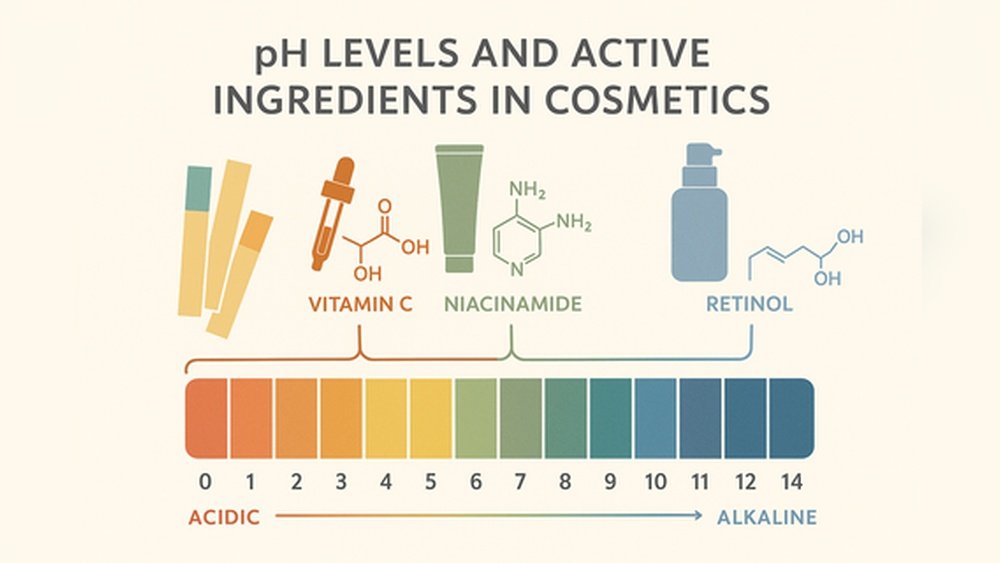Have you ever wondered why some skincare products make your skin feel great, while others leave it dry, irritated, or worse? The secret often lies in one simple factor: the pH level of the cosmetics you use.
Your skin has a natural pH balance that keeps it healthy, protected, and glowing. When you apply products with the wrong pH, it can disrupt this delicate balance, causing problems like dryness, sensitivity, acne, or even premature aging. Understanding how cosmetic pH affects your skin compatibility is key to choosing the right products that work with your skin, not against it.
Keep reading to discover how pH influences your skin’s health and what you can do to maintain the perfect balance every day.
Skin Ph Basics
Understanding skin pH is key to choosing the right cosmetic products. The pH level affects how well your skin reacts to skincare and makeup. It can influence moisture balance, irritation, and even acne. This section explains the basics of skin pH to help you make better skincare choices.
What Is Skin Ph?
Skin pH measures how acidic or alkaline your skin is. It is a number from 0 to 14. A lower number means more acidic, and a higher number means more alkaline. Healthy skin is slightly acidic, which helps protect against germs and damage.
Normal Ph Range For Healthy Skin
The normal pH range for healthy skin is between 4.5 and 5.5. This slight acidity keeps the skin’s acid mantle intact. The acid mantle is a thin layer of oils and sweat that guards your skin. When skin pH stays in this range, it stays hydrated and strong.
Skin with a pH outside this range can become dry, irritated, or prone to infection. Cosmetics with the right pH help maintain this balance. Choosing products that match your skin’s pH supports its natural barrier and overall health.

Credit: www.amazon.com
Effects Of High Ph On Skin
High pH levels in cosmetic products can harm the skin’s natural balance. The skin normally stays slightly acidic, which protects it from damage and keeps it healthy. Using products with a high pH can disrupt this balance. This disruption affects skin’s ability to stay hydrated and defend itself. The result is often weaker, drier, and more sensitive skin.
Barrier Weakening And Moisture Loss
High pH cosmetics can strip away the skin’s acid mantle. This mantle is a thin layer made of natural oils and sweat. It protects the skin from harmful bacteria and environmental damage. Without this barrier, the skin loses moisture quickly. The skin becomes less able to hold water, leading to dryness.
Dryness And Flaking
When the skin loses moisture, it feels dry and tight. Dry skin can start to flake and peel. Flaking skin looks rough and dull. This happens because high pH products disrupt natural oils that keep skin soft. The skin’s surface becomes uneven and uncomfortable.
Increased Sensitivity And Irritation
High pH weakens the skin’s defense against irritants. The skin becomes more sensitive to harsh products and pollutants. Redness, itching, and inflammation are common signs. Sensitive skin can react badly to even mild cosmetic ingredients. This leads to discomfort and longer healing times.
Acne And Infection Risks
High pH affects the skin’s good bacteria, called the microbiome. This imbalance allows acne-causing bacteria to grow faster. The risk of breakouts and infections rises. Harmful bacteria and fungi can enter through the weakened barrier. This causes more skin problems and delays healing.
Premature Aging
A damaged skin barrier struggles to repair itself. Constant moisture loss and irritation speed up aging signs. Fine lines, wrinkles, and dullness appear earlier. The skin loses its natural glow and elasticity. High pH products can accelerate this process over time.
Causes Of Ph Imbalance
Maintaining the right pH balance is crucial for healthy skin. The skin’s natural pH is slightly acidic, usually around 4.5 to 5.5. This acidity helps protect the skin from harmful bacteria and keeps it hydrated. Several factors can disturb this balance, leading to skin problems like dryness, irritation, and breakouts. Understanding what causes pH imbalance helps you choose the right skincare and protect your skin’s health.
Harsh Skincare Products
Many skincare products have a high or low pH that can harm your skin’s natural acid mantle. Soaps and cleansers that are too alkaline strip away natural oils. This causes dryness and irritation. Products with strong chemicals can also upset the pH balance. Using gentle, pH-balanced products supports skin health and prevents damage.
Overwashing And Hot Water
Washing your face too often removes essential oils that keep your skin moist. Hot water can worsen this effect by opening pores and stripping oils faster. Overwashing combined with hot water disrupts the skin’s pH. This weakens the skin barrier and causes redness and sensitivity. Use lukewarm water and limit washing to maintain balance.
Environmental And Household Factors
Pollution, harsh weather, and dry air affect skin pH. These conditions can dry out skin and disrupt its protective layer. Household cleaning products and hard water also impact skin pH negatively. They contain chemicals and minerals that can irritate skin. Protecting your skin from these factors helps keep its pH stable and healthy.

Credit: kblcosmetics.com
Cosmetic Ph And Skin Types
Cosmetic pH plays a crucial role in how products interact with different skin types. The skin’s natural pH is slightly acidic, typically around 4.5 to 5.5. This acidity helps protect the skin from harmful bacteria and maintains moisture balance. Cosmetics with a pH that matches or supports this natural level improve skin compatibility and health.
Different skin types respond uniquely to pH levels in cosmetics. Acne-prone skin often benefits from lower pH products, while sensitive or dry skin may need higher pH formulations. Understanding these differences helps choose the right products for healthier skin.
Low Ph Benefits For Acne-prone Skin
Acne-prone skin thrives in an acidic environment. Low pH cosmetics help reduce excess oil and prevent breakouts. They maintain the skin’s acid mantle, which controls bacteria growth. A balanced acid mantle stops acne-causing bacteria from spreading. Using low pH cleansers and treatments can calm inflammation. They also prevent clogged pores and keep skin clear.
High Ph For Sensitive And Dry Skin
Dry and sensitive skin often loses moisture easily. High pH products can help restore hydration and soothe irritation. These cosmetics reduce dryness by balancing the skin’s moisture levels. They calm redness and strengthen the skin barrier. Products with a slightly higher pH help protect against environmental stress. Choosing gentle, high pH formulas supports skin comfort and repair.
Choosing The Right Products
Choosing the right cosmetic products plays a key role in keeping your skin healthy. The pH level of these products affects how well your skin accepts and reacts to them. Using cosmetics that match your skin’s natural pH helps maintain its balance. This balance keeps the skin barrier strong and reduces problems like dryness or irritation. Here are some ways to pick and use the best products for your skin’s pH.
Identifying Ph-balanced Cosmetics
Look for products labeled as pH-balanced. These usually have a pH between 4.5 and 6.5, similar to healthy skin. Check the packaging or product details for pH information. Avoid products with very high or very low pH levels. Such extremes can harm your skin’s natural barrier. Choose gentle cleansers and moisturizers designed to protect the skin’s acid mantle.
Tips For Maintaining Skin Ph
Use lukewarm water to wash your face instead of hot water. Hot water can strip natural oils and raise skin pH. Apply moisturizers right after cleansing to lock in hydration. Avoid over-cleansing, which can disturb skin balance. Regularly use products with soothing ingredients like aloe vera or chamomile to support your skin’s pH.
Avoiding Common Ph Disruptors
Steer clear of harsh soaps and strong detergents with high alkaline levels. These can damage your skin barrier and cause dryness. Limit the use of alcohol-based toners and astringents. These products may raise skin pH and increase sensitivity. Avoid frequent use of exfoliants with strong acids or bases. Overuse can upset your skin’s natural pH and cause irritation.

Credit: www.amazon.com
Frequently Asked Questions
How Does Ph Affect Skincare?
Skin pH affects barrier function, moisture, and bacteria balance. Low pH prevents acne; high pH causes dryness, irritation, and infections. Maintaining balanced pH protects skin, reduces sensitivity, and supports healing for healthier skin.
Is Ph 7 Too High For Skin?
A skin pH of 7 is too high and can disrupt the acid mantle. This causes dryness, irritation, and increases infection risk. Maintaining a slightly acidic pH (around 4. 5-5. 5) protects skin health and prevents sensitivity, acne, and premature aging.
What Happens To Skin When Ph Is Too High?
A high skin pH disrupts the acid mantle, causing dryness, irritation, inflammation, and increased infection risk. It weakens the skin barrier, leading to sensitivity and potential acne breakouts. This imbalance may also cause premature aging by impairing skin repair and protection.
Is Ph 2.5 Safe For Skin?
A pH of 2. 5 is very acidic and may irritate or damage skin, especially sensitive types. Use with caution and patch test first.
What Is Cosmetic Ph And Why Does It Matter?
Cosmetic pH measures how acidic or alkaline a product is. It affects skin’s balance and health.
How Does Cosmetic Ph Affect Sensitive Skin?
High pH can irritate sensitive skin. Low pH products help soothe and protect it better.
Can Cosmetic Ph Cause Skin Dryness Or Oiliness?
Yes. High pH can dry skin, while low pH can increase oil production in some cases.
Conclusion
Cosmetic pH plays a key role in how your skin reacts to products. Balanced pH helps keep the skin’s barrier strong and healthy. Using products with the wrong pH can cause dryness, irritation, or breakouts. Choosing cosmetics that match your skin’s pH supports moisture and reduces sensitivity.
Remember, gentle care and the right pH level protect your skin better. Pay attention to product labels to maintain healthy skin compatibility. Small changes make a big difference in skin comfort and appearance.
 Skip to content
Skip to content 